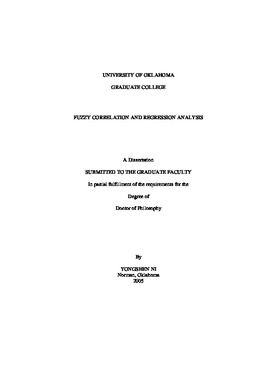| dc.contributor.advisor | Cheung, John, | en_US |
| dc.contributor.advisor | Liu, Hong, | en_US |
| dc.contributor.author | Ni, Yongshen. | en_US |
| dc.date.accessioned | 2013-08-16T12:19:45Z | |
| dc.date.available | 2013-08-16T12:19:45Z | |
| dc.date.issued | 2005 | en_US |
| dc.identifier.uri | https://hdl.handle.net/11244/848 | |
| dc.description.abstract | The first half of the dissertation focuses on the motivation and concept of fuzzy correlation. Fuzzy data will be formulated in a mathematical way, and then we will build models of two types of fuzzy correlations, their computation methods are also presented in this dissertation. For the first type of fuzzy correlation problem we proposed an approximate bound as well as a number of computationally efficient algorithms. Monte Carlo sampling method is used to compute the second type of fuzzy correlation problem. The results provided by the second type of fuzzy correlation are more informative than the result of the classical correlation. | en_US |
| dc.description.abstract | Some application examples are given at the end. Fuzzy regression models could be applied in short term stock price prediction. Intel Corp. 2003 stock price data are used in this demo. The Dosage-film response is estimated with a fuzzy regression model, this procedure is presented in detail in the last section. It is found that fuzzy regression gives more consistent results than the conventional regression model since it successfully models the inherent vagueness which exists in the application by formulated form. | en_US |
| dc.description.abstract | In the second part of the dissertation, eight fuzzy regression models are discussed. In order to enhance the central tendency and remove outliers which have important impact on the regression result, different techniques are used to improve the original model. The fuzzy regression method presented in this dissertation also applies to crisp data regression cases. Numerical examples are given for all the fuzzy correlation and fuzzy regression models we explored in this dissertation for illustration and verification purpose. | en_US |
| dc.description.abstract | Correlation and regression analysis are widely used in all kinds of data mining applications. However many real world data have the characteristic of vagueness; the classical data analysis techniques have limitation in managing this vagueness systematically. Fuzzy sets theory can be applied to model this kind of data. New concepts and methods of correlation and regression analysis for data with uncertainty are presented in this dissertation. Recently, fuzzy correlation and regression have been applied to many applications. Successful examples include quality control, marketing, image processing, robot control, medical diagnosis, etc. The purpose of this dissertation is to revisit the ongoing research work that people have already done on this issue and to develop some new models related to fuzzy data correlation and regression. In this dissertation, we define and conceptualize the correlation and regression concepts within the fuzzy context. Then the presently available methods are explored in light of their limitations. Then new concepts and new models are presented. Throughout this dissertation, a number of test data sets are used to verify how our ideas are implemented. Suggestions for further research will be provided. | en_US |
| dc.format.extent | xvi, 196 leaves : | en_US |
| dc.subject | Regression analysis. | en_US |
| dc.subject | Fuzzy sets. | en_US |
| dc.subject | Engineering, Electronics and Electrical. | en_US |
| dc.title | Fuzzy correlation and regression analysis. | en_US |
| dc.type | Thesis | en_US |
| dc.thesis.degree | Ph.D. | en_US |
| dc.thesis.degreeDiscipline | School of Electrical and Computer Engineering | en_US |
| dc.note | Advisers: Hong Liu; John Cheung. | en_US |
| dc.note | Source: Dissertation Abstracts International, Volume: 66-02, Section: B, page: 1084. | en_US |
| ou.identifier | (UMI)AAI3163014 | en_US |
| ou.group | College of Engineering::School of Electrical and Computer Engineering | |
